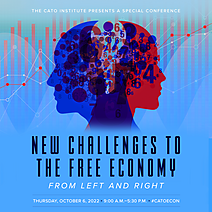The Cato Institute is hosting an economics conference on the 6th of October 2022 entitled New Challenges to the Free Economy (From Left and Right). You can register to attend in person or watch online here.
There will be a stellar line-up of speakers, including President Obama’s former Council of Economic Advisers (CEA) chief Jason Furman, former director of the Congressional Budget Office Doug Holtz-Eakin, Google’s chief economist Hal Varian, Harvard Business School’s Elisabeth Kempf, former Federal Trade Commissioner Joshua Wright, President Trump’s former CEA chief economist Casey Mulligan, and George Mason University’s Bryan Caplan.
The conference aims to bring together a broad range of pro-market economists to debate and discuss the threats to our prosperity posed by ascendant political forces on both sides of the spectrum — namely, progressivism, from the left, and national conservatism, from the right.
Though these political and intellectual movements have different aims, they are both characterized by, at best, a deep skepticism of free-market economics and, at worst, an outright hostility to it. As a result, the policies advocated by progressives and national conservatives often utilize similar government powers, albeit to achieve different social and economic objectives.
The numerous panel discussions during this all-day conference will focus on areas where opposition to free markets or limited government is strongly shared by these two movements.
Both, for example, seem comfortable with an aggressive antitrust agenda, especially in regards to curbing the power of “Big Tech.” Concerns about non-economic issues such as content moderation and privacy have spilled over into antitrust debates, with many on both sides advocating for the effective abolition of the consumer welfare standard in judging the conduct of major digital platforms.
Protectionism is another area where national conservative and progressive minds meet. National conservatives endorse tariffs, industrial policy, Buy American regulations and the aim of closing bilateral trade deficits. Many progressives are likewise globalization skeptics, who seek to protect organized labor and to deliver green industrial policy.
Both progressives and national conservatives are contributing, in different ways, to the politicization of business, whether through the jaw-boning of companies over their content moderation and political stances or through weaponizing the use of government-granted privileges. Businesses, in part as a result, are themselves becoming more politically active in economically destructive ways.
Then there’s the shared disregard both movements appear to have for the issue of long-term fiscal probity. True, the unsustainability of the public finances due to entitlements has been a long-standing problem. But an apparent embrace of Modern Monetary Theory by some on the progressive left and the clamor for a more expansive welfare state on the right threaten to make the U.S.’s structural budget position worse still.
Of course, it would be silly to pretend that because progressive or national conservative impulses both deviate from the principles of free-markets and limited government that the agendas are synonymous on economics. U.S. progressives have pushed numerous economically ignorant narratives about our current inflation, variously blaming corporate greed and high market concentration. National conservatives, on the other hand, are often strongly opposed to an open immigration system, including for high-skilled workers. Keynote speakers Furman and Holtz-Eakin will explore the threats to prosperity from each side in more detail.
As debates on these issues have developed, there is a clear and growing coalition of economists and thinkers who, although they might not always consider themselves libertarian, are nevertheless worried about the unmooring of such policy debates from economically-desirable, pro-market principles. This conference is an opportunity to hash out and critique these challenges to the free economy.

